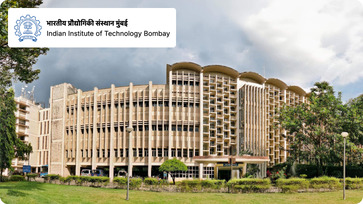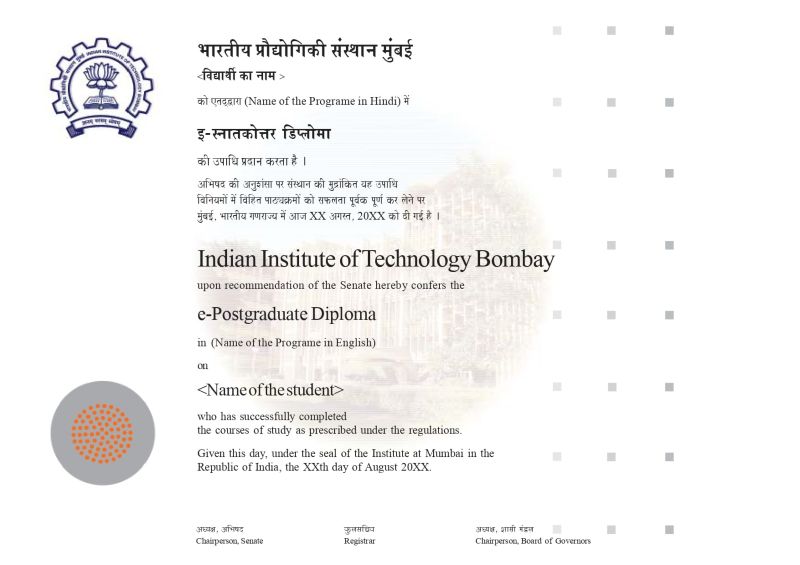Download Brochure
Check out the program and fee details in our brochure
Thanks for your interest!
An advisor will be reaching out to you soon.
Not able to view the brochure?
View BrochureGet details on syllabus, projects, tools, and more

Application closes 4th Nov 2025
Designed and delivered by IIT Bombay faculty
Earn Individual course credits which can be saved in the Academic Bank of Credits (ABC)
Online synchronous six-course curriculum designed for working professionals
IIT Bombay alumni status & In-person graduation ceremony at the IIT Bombay campus
Campus Immersion at IIT Bombay
No GATE Score required
Personalised assistance with a Programme Manager
Access to IIT Bombay’s lateral hiring group
QS World University Rankings 2025

NIRF India Rankings 2024
QS Rankings in Engineering & Technology, 2024
QS Rankings in Electrical & Electronics, 2024
This e-Postgraduate Diploma requires candidates to successfully complete 36 IIT Bombay credits across 6 courses: 2 core courses and 4 electives. The courses offered are:
Core Courses
Introduction to E-Mobility
In this course, you will build a comprehensive understanding of electric vehicle (EV) technology. You will learn about various categories of electric vehicles, powertrain components, sub-systems, and their specifications. After this, you will learn about the critical role played by power electronics in EVs, regenerative braking and integration of EVs into the grid. Additionally, this course will help you build an in-depth understanding of EV charging technologies and the business aspects of charging.
Battery Technology for Electric Vehicles
In this course, you will learn about the various aspects of battery technology, focusing on lithium-ion batteries and alternative battery solutions. After this, you will learn combining individual batteries to design battery packs and various associated concepts such as charging algorithm, estimation of State of Charge (SoC) and State of Health (SoH). You will also gain hands-on exposure through modeling and simulation of li-ion battery systems using electrochemical and equivalent circuit models. Additionally, the course covers battery management systems and battery safety considerations in detail.
Electives
Manufacturing Technologies for Electric Mobility
In this course, you will learn about identifying manufacturing technologies for making car bodies, batteries and motors. Car body design needs revisiting, in view of heavy battery altering the weight distribution and hence bending, twisting and in general, vehicle behaviour on the road. As the course proceeds, you will learn about battery manufacturing technologies which include drawing up a bill of materials for a battery, technologies in the manufacture of pouch/prismatic cells and integration into battery packs. The very technologies for autobody production work differently in the context of thin micron-thick foils. Manufacturing steps for making batteries, both Li-Ion and solid-state batteries will be discussed. Finally, the manufacture and assembly of motors of different types, including stator manufacture with the latest hairpin winding technology, and rotor manufacture using Soft Magnetic Composites will be discussed. The course will cater only to the manufacturing aspects of three systems of an EV and will not cover the electronics and control aspects of an EV.
Power Electronic Converters for EV Applications
In this course, you will learn about power electronics - a critical area for electric vehicles. You will start with the fundamentals of DC-DC converters and voltage source inverters. You will analyze how power factor correction and battery charging circuits work together to optimize performance. As the course proceeds, you will delve into the intricacies of gate driver circuits and inverter design, gaining hands-on knowledge that prepares you for real-world applications. Finally, you’ll examine the latest advancements in power semiconductor devices, which play a crucial role in enhancing the efficiency and reliability of EV systems.
Electrical Drives for EVs
In this course, you will dive into the principles of controlling DC motors for electric vehicles, beginning with field control and variable-speed drives. You’ll explore the application of brushless DC motors alongside 3-phase voltage source converters, gaining insights into their operation. The course also covers regenerative braking, allowing you to understand energy recovery in EVs. You will be introduced to key concepts like space vector transformations which will eventually lead to advanced field-oriented control techniques. This comprehensive approach will equip you with the skills needed to excel in motor control applications within electric mobility.
Electric Vehicle Grid Integration
In this course, you will explore the evolution of EV charging technologies and their integration with power grids, particularly in regions with high EV adoption. The course will cover various charging infrastructures, including Electric Vehicle Supply Equipment (EVSE) for different vehicle types and smart charging systems. As the course progresses, it will delve into regulations, tariff structures, and the impact of EV integration on distribution systems. You’ll also examine the synergy between electric vehicles and renewable energy, exploring the role of EVs in enhancing renewable energy penetration at the system level.
E-vehicle Styling and Design
In this course, you will cover the essential aspects of vehicle aesthetics, packaging, and ergonomics specific to electric vehicles. You will start with the design process, including initial vehicle sketching and computer-aided surfacing, progressing to clay modelling and prototyping. The course will emphasize both exterior and interior design, highlighting how form and function intersect in EV design. Through case studies of various vehicle types, you’ll gain insights into real-world applications, while also learning about the tools and skills required in modern vehicle design studios.
Curriculum review and changes are under the purview of IIT Bombay and would be undertaken from time to time to ensure the curriculum coverage is in line with industry requirements..
IIT Bombay Alumni Status
Upon completion, you'll have the opportunity to attend an in-person graduation ceremony at the IIT Bombay campus

Note: Image for illustration only. Certificate subject to change.
Individual course completion certificates can be issued on request for all completed courses.
*For more details on flexible fee payments, please get in touch with the Registration Team
Multiple courses will be offered simultaneously for the ePGD candidates. Total fees can be paid accordingly.

Interested candidates can apply for e-Postgraduate Diploma by filling out a simple online application form.

Applicants will go through a mandatory screening call with the Registration Office to assess their suitability for the e-Postgraduate Diploma.

The selected candidates will receive an offer letter to register for the e-Postgraduate Diploma. They will need to pay the registration fee to confirm their participation.
The eligibility criteria for the e-Postgraduate Diploma in E-Mobility is as follows:
Registration closing soon